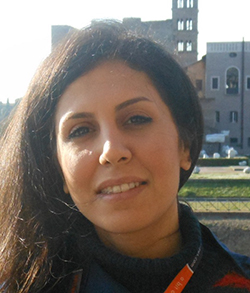Sama Shamloo (ERS 4)
Nationality: Iranian
Main Host Institution: Sapienza University of Rome, Department of biology and biotechnology “Charles Darwin”
Academic Background: Bachelor degree in “Cell and Molecular Biology”, University of Tehran, Tehran, Iran, Master degree in “Medical Biotechnology”, TMU University, Tehran, Iran, PhD in “Genetics and Molecular Biology”, 2013- Present, Sapienza University of Rome, Rome, Italy
Project title: Analysis of RNP structure of long non-coding RNAs with a relevant function in muscle differentiation
Project background: Muscle differentiation (myogenesis) in vertebrates is a highly ordered process. Early investigations have shown that protein factors are main regulators of muscle differentiation; however, more resent studies revealed that non-coding RNA (ncRNAs) could be a part of this regulatory system as well.
LncRNAs represent a class of ncRNAs longer than 200 nucleotides with no protein coding capacity. They regulate gene expression through the formation of different ribonucleoprotein complexes and exert function in a variety of cellular pathways. Different studies have shown that lncRNAs are important in controlling muscle differentiation. For example, In our group we identified a cytoplasmic lncRNA named “linc-MD1” that regulates timing of muscle differentiation in mouse myoblasts.
Project Aim: The number of lncRNAs identified as myogenic regulators is very low and the identification of new species is strongly demanded. To increase the stock of lncRNAs involved in myogenesis, my colleagues in our group identified 30 new lncRNAs differentially expressed during myogenesis.
The aim of my project is to characterize these newly identified lncRNAs by: a. Identifying their protein and/or RNA partners with biochemical experiments such as RNA-Immunoprecipitation and RNA Pull-down, b. Predicting their function, and c. Verifying their role in muscle differentiation by other molecular techniques such as knock down and overexpression approaches.
Expected outcome: Identification and characterization of novel lncRNA molecules as myogenic orchestrators would increase our knowledge about the molecular process of muscle differentiation suggesting innovative therapeutic approaches for diverse muscular dystrophies.
